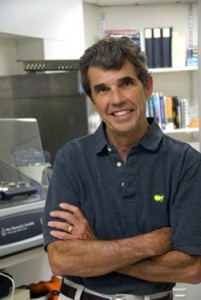California researcher’s work could lead to the development of a more potent rabies vaccine.
Bureau Report
SAN FRANCISCO: Rabies in humans remains a pernicious problem in areas of the developing world, particularly in rural India, Asia and Africa. The World Health Organization (WHO) estimates that more than 55,000 people die of rabies—an infectious disease caused by a group of viruses from the Lyssavirus genus—every year, with roughly 36 percent of those deaths occurring in India. Additionally, more than four million people are bitten by dogs with rabies and thus should receive treatment.

However, current treatments for curing rabies (cell culture vaccine plus antibodies from a previously vaccinated human or horse) are effective but are often unavailable, expensive, or inconveniently distant from disease-burdened areas. That’s where research being done at Keck Graduate Institute (KGI) in Claremont, California, comes in.
Working under the supervision of adjunct professor, Dr. Larry Grill, researchers like PhD candidate Ryan McComb are conducting research that could lead to the development of a more potent, less costly and locally produced plant-made rabies vaccine. By increasing both the availability of rabies vaccine (through lowered production costs) and reducing the number of times an exposed person needs to receive a booster shot, the vaccine would have the potential to greatly ease the rabies burden in developing countries.
“With our goal of developing and providing inexpensive vaccines that will be produced in developing countries, the rabies vaccine could be the accomplishment of the decade,” Grill said in a statement.
Founded in 1997, Keck Graduate Institute of Applied Life Sciences is the only graduate institution in the United States devoted solely to bioscience education and discovery.
KGI President Sheldon Schuster is now going on a trip to India next week, to New Delhi and Bengaluru, to discuss plant-made vaccines including rabies vaccine and other research being done at KGI and its Centers for Biomarker Research, Bioprocessing and Rare Disease Therapies.
A modified plant virus vaccine is essentially a plant virus that has been re-engineered to mimic the physical structures and properties of a disease-causing pathogen, such as virus, bacteria or parasite. Plant-made rabies vaccines work by using plant virus nanoparticles as antigen presentation scaffolds for eliciting protective antibodies from the immune system.
“Introducing what ‘looks like’ the dangerous pathogen into the body, gives the immune system the ability to prime the body’s defenses for the real disease threat without causing the disease,” McComb says. “Plant viruses are safe since they don’t infect and replicate in animal cells but still act as a potent activator of the body’s immune system.”
Furthermore, plant-made vaccines using modified plant viruses are inexpensive to manufacture compared to cell culture vaccines since they only require water, sunlight, and fertilizer as opposed to cell culture media and large stainless steel fermenting tanks. The infrastructure for producing plant-made vaccines is much smaller and can be scaled up to meet demand by simply increasing the number of acres of plant vaccine crops. In addition, modified plant virus vaccines can be easily purified by using alternative methods that are less costly than purifying vaccine material produced in cell culture. And finally, modified plant virus vaccines are very safe since they do not require the use of animal products as found in cell culture media.
Using cutting-edge bioscience research to help develop (plant-made) vaccines that can be produced locally and cost-effectively is the focus of Dr. Grill’s work. In addition to serving as an adjunct faculty member at KGI, Grill is also a professor at Pitzer College, where he directs The Ferré/Marquet Vaccine Research Center, which is dedicated to developing cost-effective vaccines that can be produced by the countries that need them as well as addressing urgent health issues in southern Africa.


